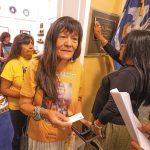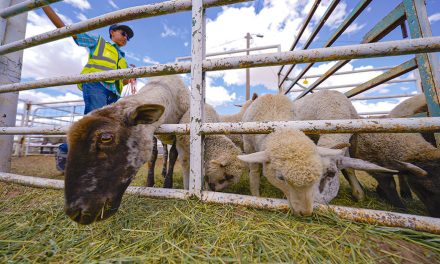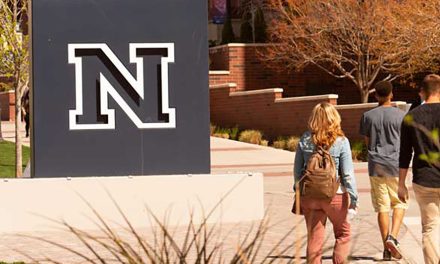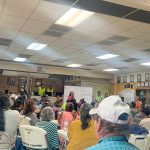
50 Years Ago: After years of effort, $4M OK’d for U.S. 666 work
Navajo leaders in the Shiprock area have tried for almost a decade to get improvements to U. S. Highway 666 and were happy to learn in 1970 that the state government had approved more than $4 million to improve the road between Shiprock and Gallup as well as making improvements near the San Juan River bridge.
The state Highway Department was supposed to go out for bids on the projects this week but instead issued an announcement that said, “The project has been put on hold because of a controversy over utility relocation.”
The state grant did not include any funds to relocate utilities thinking that this would be taken care of by Navajo Tribal Utility Authority, which said they don’t have the funds for it either.
“The situation is at an impasse,” said Renaldo Espinoza, the state highway commissioner. Navajo Tribal Chairman Peter MacDonald has sided with NTUA.
No one knows how long the impasse will continue but state officials have warned the tribe that if a solution is not reached soon, the commission may decide to use the funds elsewhere in the state.
The Shiprock Chapter passed a resolution urging the two sides to get together and find a solution, pointing out that the longer they wait the more Navajos would be killed in fatal accidents on the highway.
Over the past decade, the stretch of U.S. Highway 666 between Gallup and Farmington had seen so many fatal accidents, almost all due to drunken drivers, that locals began calling it the “Highway of Death.” And the worst area was the road between Shiprock and Farmington.
Although everyone seemed to be hoping for the state and the tribe to work out a solution, no meetings have been set up to address the problem.
Transmission line controversy
Speaking of controversies over utilities, David King, the deputy state planning director from the state of New Mexico, is facing a major disagreement over giving approval to a proposal by the Tucson Gas & Electric Company to build a transmission line through the Navajo Reservation.
As part of its approval process, the state held a meeting this month to hear testimony from Navajos who were living along the proposed route in New Mexico. All of them spoke out against it.
“Some of them even threatened violence if they tried to construct the lines over their lands,” said King.
Among the Navajos who testified during the hearing were Denise Skeet, of Twin Lakes; Leslie Begay, Coyote Canyon Chapter president; John Leslie, of Rocky Point; Eddie Brown, chapter secretary of Mexican Springs Chapter; Robert Tso, of Twin Lakes; Major Joe Watson, of Twin Lakes: and Soho Johnson, of Twin Lakes.
During her testimony, Skeet said the next person who “trespassed” on her land would be shot.
Several Navajos said the company had promised to link their homes directly to the transmission line if they gave their approval. They learned later that this was a lie because tapping the high-power line was impossible.
Four Navajos said they gave their approval but now feel they were coerced and now want to take their approval back.
Joe Wilcox, vice president of the power company, said he has not received any complaints of deception or misrepresentation to get approvals.
The company is taking the position that the chapter resolutions opposing the line won’t mean anything if the Navajo Tribal Council gives its approval. The Council last week put approval of the line on hold until more discussions are done with power company officials.
The company is proposing to build the line from the Four Corners Power Plant, which is being built, to Tucson.
Police agreement
Gallup Police Chief Manuel Gonzales said he plans to seek approval from the state Legislature to allow Navajo Police the power to make arrests off the reservation. Those arrested would be cited to state court, not tribal court.
In exchange, the Navajo government would give off-reservation police the power to come onto the reservation to make arrests if they are in “hot pursuit” of a suspect.
Gonzales said the main problem that law enforcement agencies in the Four Corners area have is enforcing traffic laws. Navajo police can’t cite non-Indians for traffic violations on the reservation and they don’t have the authority to arrest Indians off the reservation.
As a result, persons who are found speeding often try to cross reservation lines in an effort to avoid arrest, putting other drivers in danger.
Gonzales said all county sheriffs and police chiefs in the area support the proposal and have expressed a willingness to push for the legislation if it comes up to a vote in the Legislature.
The Navajo Tribal Council’s Police Committee has also gone on record supporting the proposal.
However – and this is a big however – members of both the House and the Senate are against giving tribal governments any kind of authority over non-Indians and any authority whatsoever off the reservation.
Gonzales said he knew this but he thought the proposal had enough support to be passed. It was at least worth a try, he said.








 Highway 264,
Highway 264, I-40, WB @ Winslow
I-40, WB @ Winslow